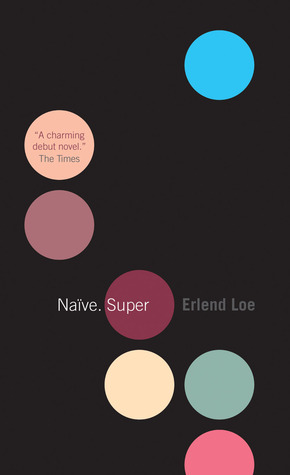I’ve tried to get friends reading Erlend Loe’s Naïve. Super for years, with relatively little success. It’s one of those books that’s virtually irreducible – the only way to understand what it’s about is to read it all the way through.

(As an aside before I even get started, irreducible books are probably, in my very humble opinion, the only kinds of books worth reading. If it’s possible to broadly explain a book away in a sentence or a paragraph or a page, it seems as though that’s a sign of the work’s weakness, as opposed to a strength. At least, as somebody working on a book I find almost impossible to explain, I really, really hope so).
Naïve. Super is structured around a Norwegian twenty-something suffering a kind of mental collapse after losing to his brother in a game of croquet. From there, not much happens. The protagonist drops all his commitments and ends up housesitting for his brother, his only job to fax any mail that arrives in the letterbox. The protagonist plays with wooden BRIO toys and throws a ball against a wall, writes lists, plays with the fax machine, and reads the works of physicist Paul Davies.
Naïve. Super is similar to Haruki Murakami’s The Wind-Up Bird Chronicle, another one of my favourites. Both Loe and Murakami play with the scale of the world, distorting and amplifying the mundane until it ends up rendered strange and fantastic. In a sense, both The Wind-Up Bird Chronicle and Naïve. Super would probably best be understood as ‘hikikomori fiction’, examining what happens when an individual drifts (whether willingly or not) outside the realm of social convention.
I recently read a review of Naïve. Super on Goodreads in which the reviewer referred to the story’s protagonist an “imbecile”, supporting their assessment by noting that, “The character in this book makes the STUPIDEST lists I’ve ever seen. I think one of them was all the animals he has seen in his life. ALL THE ANIMALS he has seen in his life!”
I guess, if anything, the question Naïve. Super fronts is simple: why are so many of us afraid to relate to the world as a child might? Why do we tend to instinctively associate naivety with stupidity, and how much do we miss by deliberately attempting to obscure our lack of experience instead of reveling in it?
Being a person is undeniably odd. We construct institutions and establish routines and conventions to cover up this oddness, and eventually these institutions routines and conventions solidify into “the way things are done”. All great writing calls “the way things are done” into question, but few pieces are as straightforward about it as Naïve. Super.